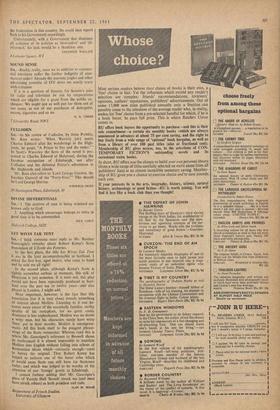SIR,-1 think someone must reply to Mr. Bamber Gascoigne's remarks
about Robert Kemp's Scots translation of L'Ecole des Femmes.
In the first place, the title Let Wives Tak Tent Is not in the least incomprehensible in Scotland. I asked the first boy, aged twelve, who came to hand and he told me all right!
In the second place, although Kemp's Scots is rightly somewhat archaic at moments, this talk of Henryson is just nonsense. If it were not, this play Would not have been repeatedly produced in Scot- land over the past ten or twelve years—and also Played in London, I might add.
Most important, however, is the fact that this translation (for it is very close) reveals something of interest about Moliere. Listening to it one be- comes more aware of the essentially familiar, earthy quality of his metaphors, for no great comic dramatist is less sophisticated. Moliere was no doubt witty man, but his characters rarely have witty lines' put in their mouths. Moliere is unepigram- matic. All this lends itself to the pungent phrase- ology of the Scots vernacular. Whereas (and this is where Mr. Gascoigne's reference to Boswell shows its irrelevance) it is almost impossible to translate Moliere into English without falling into echoes of Restoration idiom which—curiously enough—seem to betray the original. Thus Robert Kemp has helped to indicate one of the lesser roles which It would seem Scots can still have for Scotsmen l°daY, and which was judged to be worthy of the attention of our 'foreign' guests at Edinburgh. I cannot forbear adding that Mr. Gascoigne's piece of Variety Hall `Scotch' struck me (and must have struck others) as both pointless and rude.
Department of French Studies.
University of Glasgow
ALAN M. ROASE










































 Previous page
Previous page